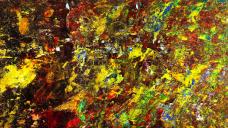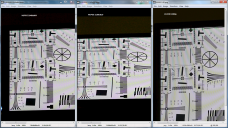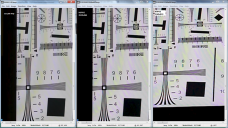
-
Incidentally, the lack of noise with Quantum 9b in 24H mode and high ISOs (1600 to 6400) seems unreal.
-
"I think you can probably shut down lens correction by going to "SHOOT W/O LENS" and setting this to "ON". Panasonic lenses will still work."
Does nothing to stop these errors. Shoot wo lens doesn't stop any of the panasonic lens's functionality as far as I've experienced. I've always had it set to on. I don't know if it turns on and off lens correction. Or if that has anything whatsoever to do with the errors.
-
Loaded Quantum 100-50 (Documentary).
Loaded http://www.amazon.co.uk/Samsung-16GB-Class-Extreme-Speed/dp/B00569J5JC into my GH2.
Loaded this texture in the browser (full screen).
Went straight to 80%VFR mode.
Set the 45mmF1.8 lens to F5.6, set ISO to 3200.
Shaken the hell out of the camera for a little over 1min.
I don't know if it spans or blends but this is what I got in StreamParser:
File: A:\PRIVATE\AVCHD\BDMV\STREAM\00001.MTS Size = 1.081.583.616 Bytes (5.633.248 Packets) Stream: Max Speed = 106.611.800 bps Mode = 1080/24pN PCR Timing Interval = 0,095 seconds Clip Time = 0:01:27,09 Average Total Bitrate = 99.358.262 Average Video Bitrate = 96.028.338 Average Audio Bitrate = 235.136 Average Other Bitrate = 3.094.787 Max GOP Size = 1.300.032 Bytes (10.400.256 bits) Video Frame Size (Min/Ave/Max)= 499.008 / 511.046 / 788.160I don't really know which was the better deal, the camera with kit lens and two batteries for 600€, the 16GB Samsung SDHC card for 18€ or Vitaly+Driftwood for free.
Enough said. It kicks ass.
THANK YOU.

 Colour_Texture_06_by_Tackon.jpg1920 x 1080 - 4M
Colour_Texture_06_by_Tackon.jpg1920 x 1080 - 4M -
That first test was around 1min ~1GB.
Now I've tried the same torture on 720p60 and gave up at around 5:30s (because I believed it should have already spanned) but the file ended up short of 3.5GB. Not only that but my shaking abilities have been seriously challenged because the report shows much less bitrate:
File: A:\PRIVATE\AVCHD\BDMV\STREAM\00002.MTS Size = 3.553.880.064 Bytes (18.509.792 Packets) Stream: Max Speed = 85.509.280 bps Mode = 720/50p PCR Timing Interval = 0,095 seconds Clip Time = 0:05:45,72 Average Total Bitrate = 82.237.187 Average Video Bitrate = -19.813.054 Average Audio Bitrate = 235.005 Average Other Bitrate = 2.429.206 Max GOP Size = 721.152 Bytes (5.769.216 bits)I don't know if this is due to the nature of 720p or if the use of P-frames is helping (still I'm not buying it because they are very marginally smaller than the I-frames)
Thanks again.
-
I thought some of you would like to know that I tried Quantum v7 at night, with ISO 1250 opened to f2. Everything in the image, including the well lit areas was very noisy. Wondering why that was?
Thanks.
-
@cinepaint, ISO 1250 may be problematic if you don't know about the discussion here:
http://www.personal-view.com/talks/discussion/1280/gh2-iso-noise-bug-at-320-640-and-1250
Otherwise, please post a frame and someone may have some feedback that may assist you. Regards, WR
-
-
Hey everybody! Id like to show you what I was able to do with the Aquamotion patch. The driving scenes were shot with 24L toned down to 66mbps. The rest are shot with the 24H 100mbps mode. I know its a little behind but I just wanted you guys to check it out and if possible pass me some tips on how to utilize the hacks better. Now I am trying the Terraquake patch with 24H toned down to 132mbps and 24L down to 100mbps just because my card can handle those bitrates better. Thanks again and I hope that you guys can give me any type of criticism to help me out.
-
That was exceptionally beautiful. You've got some really great grading and compostion there. What were your settings (Color profile, shutter speed, etc.)? What lens(es) did you shoot on? What was your post production process?
Some really great softening in there, it seems.
-
@driftwood : You're probably right, the video bitrate was stable and well above 80Mbps.
-
@artiswar Thank you! :) -the color profile was smooth, all -2. -I edited the clips in Premiere Pro CS5 avchd timeline. -Exported to prores422HQ. Put it in FCP, recut the video, and sent it to color then back to FCP it went. -Then compressed to h.264 with compressor. then up to vimeo and youtube.
-
@artiswar And the lenses i used were the Lumix 14mm 2.5 and the Sigma 24-70 Canon mount with the kipon adapter.
-
We have been discussing that for a long time – shutting down any sharpening at least – but it seems to be difficult.
Let's do tests of electronic lenses vs. manual glass.
-
deleted
-
Something like that is what I was looking for. But one question: is it possible in any way to change the AQ to 4 and that it still works in every mode with a SanDisk Extreme 30MB class 10?
-
Can you try the file that produced the integer error with the newest version of StreamParser (available in the StreamParser thread near the end)? If there is an overflow problem then I would like to fix it, but I may have already.
Chris
-
True. Make sure you always upgrade to the latest (and greatest) version of Streamparser - see http://www.personal-view.com/talks/discussion/comment/36586#Comment_36586
-
Sorry @cbrandin, I binned the files shortly after the test. :( I can't even remember the disk they were in to try an undelete)...
@driftwood: I'm on a timelapse AVCHD vs MJPEG quest now and I've got some unusual findings:
The MJPEG 2048x864 resolution is much superior to 2160x810 (this one looks like garbage, I even thought that AVIDEMUX didn'tunderstand it, but then I tried 1920x1080 and even though its also skewed, it's also much better)
MJPEG 2048x864 even beats AVCHD FHD 1920p1080 in horizontal resolution by a whisker. Check it out.
I'll be exploring it for timelapses but it eats bitrate like the devil, so I'll have to short it to 2fps and tone the bitrate down because I'm not very found of the idea of sacrificing one of the AVCHD modes instead... :(

 HR modes.png1920 x 1080 - 3M
HR modes.png1920 x 1080 - 3M
 rescaled to 1080p.png1920 x 1080 - 3M
rescaled to 1080p.png1920 x 1080 - 3M -
@duartix Thats an interesting set of results. Incidentally, mjpeg is still being pushed to find the limits. So it could get better.
-
is Quantum 100 the replacement for Aquamotion2?
-
back in 720p 60 world. lumix 14-140. Testing with both af and manual, fast and slow zoom. Zooming and af don't seem to have much effect on whether the write error occurs or not. I've also yet to have a variation work on the 95mb/sec card and not on the 30mb/sec card.
I've been able to get 720p "stable" by lowering aq to 0 and the 60fps encoder frame limit to 1403779 from 1413779. There was no way to get it stable with the aq any higher.
stream parser has 2pframe, one I frame pattern. Pframes at around 40- 80k. I frame is about 80k -160k. Bitrate is reported as 48mb.
The footage looks fine to me. It's noisy but shooting inside with the 140 is always noisy on 720 60p.
-
Well, I though it might be a good idea to test MJPEG for 2304x1152 (it's a 2:1 horizontal bin and a 3:1 vertical) but besides having speed problems (it bails out at 5s) the output is as bad as was 1080p or 2160x810... Back to 2048x864... @driftwood How did you get to that magical resolution? I mean I know 2048 is magical but 864???
-
I'm guessing because 864 X 2048 = 2.37:1 aspect ratio, which is equal to the GH2's native 1.78:1 aspect ratio combined with a 1.33X anamorphic lens squeeze.
Vincent
-
@duartix On the GH2, 2048x864 is a 1.33x anamorphic aspect ratio, and will produce 2.37:1 widescreen videos with square pixels when used with a 1.33x anamorphic adapter. This is the widest anamorphic frame that fits within the 2K DCI standard, which defines a 2048x1080 frame. It can also be cropped down to a 1920-wide frame for Blu-ray compatibility.
-
Hello, I'm new on hacking and confused a little bit, there are a lot of versions of patches (aquarius, reaquinted,quantum etc..) i try to understand that the newest version such as quantum v9b is the best one on quality and stability compared to the others? I want the best intra quality on 1080p24, so I must prefer reaquinted (old patch)? Or quantum 9b also has best Intra settings (176mbit...)
Thanks a lot Cem
Howdy, Stranger!
It looks like you're new here. If you want to get involved, click one of these buttons!
Categories
- Topics List23,992
- Blog5,725
- General and News1,354
- Hacks and Patches1,153
- ↳ Top Settings33
- ↳ Beginners256
- ↳ Archives402
- ↳ Hacks News and Development56
- Cameras2,367
- ↳ Panasonic995
- ↳ Canon118
- ↳ Sony156
- ↳ Nikon96
- ↳ Pentax and Samsung70
- ↳ Olympus and Fujifilm101
- ↳ Compacts and Camcorders300
- ↳ Smartphones for video97
- ↳ Pro Video Cameras191
- ↳ BlackMagic and other raw cameras116
- Skill1,960
- ↳ Business and distribution66
- ↳ Preparation, scripts and legal38
- ↳ Art149
- ↳ Import, Convert, Exporting291
- ↳ Editors191
- ↳ Effects and stunts115
- ↳ Color grading197
- ↳ Sound and Music280
- ↳ Lighting96
- ↳ Software and storage tips266
- Gear5,420
- ↳ Filters, Adapters, Matte boxes344
- ↳ Lenses1,582
- ↳ Follow focus and gears93
- ↳ Sound499
- ↳ Lighting gear314
- ↳ Camera movement230
- ↳ Gimbals and copters302
- ↳ Rigs and related stuff273
- ↳ Power solutions83
- ↳ Monitors and viewfinders340
- ↳ Tripods and fluid heads139
- ↳ Storage286
- ↳ Computers and studio gear560
- ↳ VR and 3D248
- Showcase1,859
- Marketplace2,834
- Offtopic1,320








